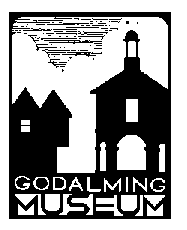Photographs of Old Godalming
19 fascinating photographs showing the old cobbled High Street, its shops and the Pepperpot, Church Street, other nearby roads, and two local mills. Laminated for easy handling, these provide a wonderful insight into Godalming in the past couple of centuries.
Top of page
Photographs of Godalming and District in 1921
37 views of Godalming and District with historical and descriptive notes. These are laminated and give a historical picture of this area between the two World Wars. They are also a good resource for the literacy hour. The original book is included for display purposes.
Top of page
Tudor Times - The Dawn of Printing
The invention of printing in the mid-fifteenth century produced an information explosion that fuelled the Renaissance. This box contains leaves from books printed in the late 15th century (during the reign of Henry the Seventh) and a leaf of a manuscript book of circa 1400. Extensive teaching notes describe the way both manuscript and early printed books were produced. A 17th century book is included to show how books have developed after this pioneering period.
Top of page
Please note a second Tudor box, ‘Life in Tudor Times’ will be available soon.
In Granny’s Day
A collection of simple everyday household objects which were being used in the 1950s. A darning mushroom with hosiery darning cottons, knicker elastic, a bakelite thimble, grate polish and a wooden pencil box are just a few of the handling items which introduce us to a different world only fifty years ago.
Top of page
A Victorian Collection
An original souvenir copy of a local photographer’s record of ‘Godalming Diamond Jubilee’ in 1897 and two original Victorian scrap books (one on linen) are included for display purposes.
Handling items include:
-
a medal to celebrate the opening of Hascombe School in 1867 showing Queen Victoria on the reverse side
-
an ‘In Memorium’ Card
-
a copy of Witley Parish Magazine for 1887 with details of village plans for the Queen’s Golden Jubilee
-
a book of ‘Little Poems for Little Readers’
-
a bead purse
-
a Bible marker
-
a penny dated 1900
-
8 laminated photographs of Queen Victoria’s Diamond Jubilee celebrations in Godalming.
Top of page
Life in Roman Times
A remarkable range of authenticated Roman artifacts in pottery, metal and glass, together with bones and oyster shells from a Roman kitchen, are presented to give a fascinating view of domestic life in Roman times. These are supported with extensive teaching notes and with a selection of books and pamphlets for additional background information.
Top of page
Roman Buildings
A selection of original artifacts from Roman buildings are presented. These are supported by two model kits with which students can assemble a typical Roman tiled roof and a Roman hypocaust floor; a wonderful ‘hands-on’ learning experience in the classroom. Extensive teaching notes are included.
Top of page
Roman Mosaics
This box contains genuine tesserae from Roman mosaic floors (including one tessera from the local Binscombe Roman villa), illustrations of complete floors and teaching notes. In addition a stock of modern tesserae in four colours is supplied, together with convenient trays to allow students to enjoy generating their own mosaics; another ‘hands-on’ learning experience.
Top of page
Roman Arithmetic
The methods the Romans used for adding and subtracting are described in a sequence of display cards, supported by examples of original Roman and later counting tokens. Additional display cards cover the pre-Roman number system and the replacement of Roman by Arabic numerals.
Top of page
